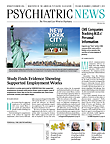Those hoping that researchers would answer concerns about a possible relationship between use of SSRI antidepressants by pregnant women and autism spectrum disorder (ASD) in their offspring may be disappointed by the outcome of four recent studies on the topic, since two found evidence of such a link and two others did not.
The first was a population-based case-control study led by Lisa Croen, Ph.D., of Kaiser Permanente Northern California and published in the November 2011 Archives of General Psychiatry.
Some 300 children with autism and their mothers, as well as 1,500 randomly selected control children and their mothers, were evaluated to see whether there was any link between SSRI antidepressant prescriptions dispensed before and during pregnancy and the risk of autism. The researchers found an approximately twofold increased risk of ASD associated with SSRI prescriptions dispensed during the year before delivery and an approximately fourfold increased risk associated with SSRI prescriptions dispensed during the first trimester.
The second was a Swedish study headed by Dheeraj Rai, Ph.D., of the University of Bristol in England and published in the April 19, 2013, British Medical Journal, which included more than 18,000 children. Of these children, 1,679 had ASD with or without intellectual disability, and the remaining children served as age- and gender-matched controls.
Information about whether the children’s mothers had been treated for depression during pregnancy was available from inpatient and outpatient psychiatric records, and information about whether the mothers had used antidepressants during pregnancy was obtained from interviews with the mothers when they were, on average, 10 weeks pregnant.
The researchers assessed whether there was an association between antidepressant use during pregnancy and ASD in the offspring, taking possibly confounding factors into consideration. Women who had used antidepressants during pregnancy were three times more likely to have a child who developed ASD without intellectual disability than were those who had not used antidepressants. Moreover, the association held whether the women had used an SSRI or a non-SSRI antidepressant. However, there was no evidence of a link between maternal use of antidepressants during pregnancy and an ASD with intellectual disability.
The third study was conducted in Denmark. It was headed by Anders Havid, Dr. Med. Sci., of the Statens Serum Institute in Copenhagen and published in the December 19, 2013, New England Journal of Medicine. It included more than 600,000 children born in Denmark from 1996 through 2005 and followed up through 2009.
During follow-up, the researchers identified 3,892 cases of children with ASD, 52 of whom had been exposed to SSRIs during pregnancy. As compared with no use of SSRIs both before and during pregnancy, use during pregnancy was not associated with a significantly increased ASD risk in the offspring.
The fourth study was also conducted in Denmark. It was led by Merete Sorensen, Ph.D., of Aarhus University Hospital and published online November 15, 2013, in Clinical Epidemiology.
The study included more than 600,000 children born in Denmark from 1996 to 2006. The researchers determined which children had been exposed to SSRIs during pregnancy, which had an ASD, and whether children exposed to SSRIs during pregnancy had a significantly greater ASD prevalence than children not exposed to SSRIs during pregnancy. The researchers did not find evidence of such a relationship.
Thus two of the studies found a link between SSRI use during pregnancy and ASD risk, and two did not.
“In the Croen study, the number of cases was very small, and the only evidence of SSRI use was that the women had been given one prescription for medication early in pregnancy,” Gail Robinson, M.D., director of the Women’s Mental Health Program at the University of Toronto and the APA Minority/Underrepresented Group Trustee, told Psychiatric News. “Therefore, there was no clear evidence that the women had actually taken SSRIs during pregnancy.”
“And in the study by Rai et al., they could not distinguish whether the antidepressant or the depression itself caused an increase in ASD. [Yet] even if there was a causal relationship, it would explain less than 1 percent of the cases,” Robinson pointed out. “Therefore, of the four studies, only the one with small numbers and major limitations in methodology [really] found a link. The better studies found an insignificant or no link to autism. Thus the risks related to untreated depression during pregnancy (for example, poor appetite, insomnia, suicide attempts, failure to attend prenatal visits, or increased maternal stress hormones) far outweigh” SSRIs in concerns about risk for developing ASD.
“Prenatal risk factors for autism spectrum disorder are an important area of research, and these conflicting findings justify further study with rigorous, prospective studies,” said Laura Politte, M.D., an autism expert at Harvard Medical School.
“In the two studies that found an association between maternal SSRI use and ASD in the offspring, if a direct causal association was assumed, the overall conferred risk for ASD is still quite low, and this possible risk must be balanced against the known developmental risks to offspring of untreated maternal depression,” Politte stated. ■
